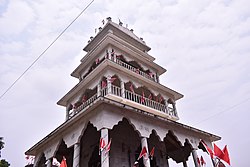 The Thakurbari Temple of the Matua Mahasangha | |
| Total population | |
|---|---|
| c. 50 millions | |
| Founder | |
| Harichand Thakur | |
| Religions | |
| Hinduism | |
| Languages | |
| Sacred Bengali and Sanskrit Holy Book Harililamrito Majority Bengali | |
| Related ethnic groups | |
| Namasudras |
The Matua Mahasangha (Bengali: মতুয়া মহাসংঘ[1]) is a Hindu reform movement that originated around 1860 AD in modern-day Bangladesh. Today, it has a considerable number of adherents both in Bangladesh and in West Bengal, India.
The Matua movement originated among the Namasudras, an avarna (outcaste) community of Bengali Hindus, founded by the followers of Harichand Thakur. The teachings of Harichand, also known as Matuaism, emphasise the importance of education for the upliftment of the population, while also providing a formula for ending social conflict.[2]
Members of the Matua Mahasangha believe in Swayam-Dikshiti ("Self-Realisation") through harinaam, the chanting of the holy name of Hari (God). Harichand stressed the congressional chanting of God's name as the sole means to mukti (liberation). In Bengali, this is known as hariname matoara, giving rise to the name "Matua".
- ^ "In Bengal, battle for Matua vote heats up". Hindustan Times. 23 March 2021. Retrieved 19 December 2022.
- ^ Mukherjee, Sipra (3 April 2018). "In Opposition and Allegiance to Hinduism: Exploring the Bengali Matua Hagiography of Harichand Thakur". South Asia: Journal of South Asian Studies. 41 (2): 435–451. doi:10.1080/00856401.2018.1445400. ISSN 0085-6401.